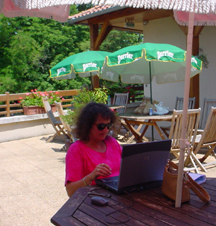
Perhaps you have a full-time job, and your annual holiday is the only time that you can set aside to concentrate on your writing. Perhaps you want to get away from the distractions and responsibilities of your home environment to give yourself some peace and quiet to write. A creative writing course in an idyllic setting - combining a well-earned change of scenery with expert advice and guidance on your writing - would seem to be the perfect answer. But with more and more people buying old properties and converting farms and outbuildings into bed and breakfast accommodation or holiday apartments: offering “courses” has become the ideal way to fill empty rooms. How can you ensure that your money and time is well spent?
Find
out exactly what the course will achieve
- and decide if it meets your needs
- and decide if it meets your needs
Some writing holidays and retreats are very relaxed and informal - ideal if you want to pen the odd poem or essay in between getting a suntan and enjoying the sights. On the other hand, some courses offer the chance to take your writing a step forward with structured workshops and guidance.
Before you commit to investing a writing course, ask yourself what you want from it and see if it meets your demands. Here are some things to consider...
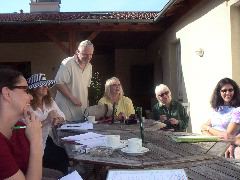 • How big
are the
groups, and how many tutors are there?
• How big
are the
groups, and how many tutors are there? One tutor for a large group of people makes financial sense for the organisers, but can lead to large impersonal groups, where tutors keep their distance from the people on the Course and dish out lectures on theory. There are general principles and advice which can help any writer: but if you want advice that is genuinely helpful, it has to be specific and relevant to you and your own project. If you want personal advice choose a course where the numbers are limited.
• How many individual tutorials will you receive?
One-to-one attention is vital if you are going to benefit from your course - and the more a tutor gets to know about you and your writing the better. If you are simply going to listen to lectures without getting personal feedback, it would be cheaper for you to buy a how-to-write book! The more one-to-one tutorials you can have, the better.
• Is there a structure to the Course?
Most courses offer an environment promising writing exercises or workshops and discussion groups, but how constructive are they? Are they simply a way to pass the time, or are they structured with a purpose? If you have a goal in mind, will the course help you to achieve it?
The most important element of a course is the person in charge of it and the more you want to get out of a course, the more important that person becomes. So the next thing you ought to do is...
Check
the credentials of the organisers
Anyone can claim that they are qualified to lead a writing Course. How can you tell if what they have to offer is worth your time and money?
Broadly speaking, tutors will fall into two categories:
1) Professional writers. Their background is the practice of writing. Their advice comes from personal knowledge and experience. They can identify with the people on the course and pass on hints and tips first-hand.
2) Teachers or “facilitators”. What they offer you is theory-based. They will have had the experience of teaching the principles of writing and the best of them will have a proven ability to guide their students towards improvement.
The ideal, is to find someone who combines the qualities of both of the above. But if you have to make the choice, I would lean towards the professional writer.
It’s true that not every professional writer will make a good tutor - not everyone has the ability to pass on their expertise. But on the other hand, I think it’s essential that every tutor can show evidence that they are able to write.
If you aspire to have your work published or produced, an academic or an enthusiastic amateur won't have any personal experience to draw upon to help or advise you.
The best way to judge what what a tutor might be able to offer you, is to examine what exactly they have done for themselves.
But don’t take their word for it! Use the internet to check their references. People can make all sorts of claims about themselves and their experience. but genuine credentials leave a paper trail, or nowadays, a web-page trail. Put their name into a search engine like Google and see what you can find out...
 • Are
their claims backed up by references to
them in the public domain?
• Are
their claims backed up by references to
them in the public domain? Can you find references on other websites confirming who they are and what they have done?
• Do they have a personal website?
What does it tell you about them?
• Are they represented by a reputable literary agent?
Professionals writers will have one, and it may be interesting to find out what other writers their agent represents.
• Are there any independent articles about them or their work or are there any reviews of their work online?
Find out what other people say about them.
• Check Amazon.com
Find out if they have books in print and for sale
• Check IMDB.com (the internet movie database)
It lists everyone who's anyone in TV and film.
• Are they successful?
Have they won any awards? Is their work any good in other people’s opinion?
And, more importantly, is it any good in your opinion? How can you tell...?
Find out! Buy it. Read it. Rent the video or DVD - watch it. And judge it.
Remember, if a person can't put their theories into practice themselves, what use will their theories be to you? If they haven't had a book published or a drama produced, don't you have to ask yourself - or them - why not? If they haven't been through the process - and have no personal experience of it - can anything they have to say about it be enlightening?
Examine
the quality of the accommodation and meals
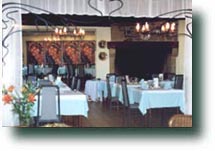 The
quality of accommodation varies enormously - from private rooms in
hotels to shared rooms in self-catering apartements. If you
are
to be put up in “Bed and Breakfast” accommodation or an apartment,
you
will have to remember to budget for providing some, or all, of
your own
meals. You may even find that your facilities include a
communal
kitchen where you will be expected to to make your own - and
everyone
else's - meals, as well as cleaning up afterwards: which can take
a
large chunk out of your available writing time, every day.
The
quality of accommodation varies enormously - from private rooms in
hotels to shared rooms in self-catering apartements. If you
are
to be put up in “Bed and Breakfast” accommodation or an apartment,
you
will have to remember to budget for providing some, or all, of
your own
meals. You may even find that your facilities include a
communal
kitchen where you will be expected to to make your own - and
everyone
else's - meals, as well as cleaning up afterwards: which can take
a
large chunk out of your available writing time, every day.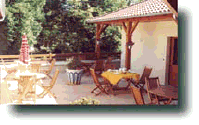
Coming on a writing Course may be part of fulfilling a long-held dream or ambition - in which case you will want to be able to concentrate on your writing without having any other concerns and responsibilities. If you want your writing to take precedence over everything else, then you would probably prefer to relax in a hotel environment with professionals looking after all your needs, to have a fully-trained chef preparing gourmet meals for you, to be served dinner at your table, and to let someone else take care of the washing up.
It’s important to get a clear picture of what you can expect...
• What sort of accommodation will you be staying in?
A room in someone's house? A room in a cottage or a converted barn? Will you have to share with someone you don't know? Are the bathroom facilities shared? Will you have the privacy of a hotel room with your own en suite facilities?
• Exactly how many days does the Course last?
Some courses advertised as a week are in fact only five days. Remember to check this when doing cost comparisons between courses.
• What meals are included in the price, and who will be preparing them?
Will you be cooking for yourself, or if someone is cooking for you, will that person be a trained chef?
• Will you have to make your own bed, be expected to do the washing up?
Are there staff on hand to take care of the daily chores, or will you be expected to spend some of your writing time doing them?
• Is there a bar or lounge, and will you be able to order refreshments whenever you like throughout the day?
In a week when time is precious, it’s important to know what if refreshments are available on hand, or if your will have to travel to the nearest cafe every time you feel like a cup of tea or coffee, or glass of water (or something stronger),
• Will you have air conditioning, telephone, TV, internet access?
Read
what people say who have been on the course
When reading about a course on its website, don’t take all the claims at face value. The best way to get an impression of what a course is really like, is to read what people who have actually been on it, say about their experiences. Check the website to see if they have testimonials from previous participants. Naturally people will only put the most complimentary remarks up on their website, but you can tell a lot from the quantity and quality of the testimonials.
• Are there many testimonials on the website?
If there are only one or two, and the course has been running for several years, you have to wonder why...
• What exactly do the people say the course did for them?
Look beyond the “wonderful course”, “lovely time” quotes - when you read the testimonials, do people mention the things they got out of the course, and do they match what you are looking for?
Establish
contact by E-mail with the organisers...
Writing an E-mail to the organisers with questions about the course will tell you a lot about the people you are dealing with. You can find out more about why they are doing the course and how successful it has been.
• Do they respond promptly?
• Do they address your concerns?
• Can they put you in touch with previous participants?
It will always be a gamble, booking a residential creative writing course over the internet. But the more research you do, the more you reduce the risk of disappointment.
One
last word from the other side of the fence...
It’s magical when your writing is going well. But it can be just as rewarding when you can pass that magic on to someone else.
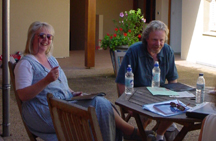 My
husband, Peter May, and I both won writing awards in our early
twenties
and have spent all our adult lives as professional writers. I
started
out as a theatre playwright and had the first professional
production
of my work when I was 22. Peter was a journalist before
having
his first novel published at the age of 26. For most
of the
80s and 90s we spent our time writing for television (we met on
the
writing team of Scotland's most popular drama series).
During those years we wrote more than 1000 hours of television
drama in
the UK. Peter has now returned to writing novels, taking his
tally to ten. His latest series of books, the best-selling
'China
Thrillers' have been translated into several languages and will be
published in the USA in Spring 2005. I have recently written
a
novel, a romantic comedy, published in the US, and this year I
made a
foray into the world of non-fiction with the recent publication of
a
"how-to" book. So between us we have experience of most
types of
writing. We also, more importantly, have professional
experience
as editors, working with and advising other writers on improving
their
work. And organisations like Scottish Television and the
European
Film School in Denmark have called upon us to run courses and
workshops
in creative writing.
My
husband, Peter May, and I both won writing awards in our early
twenties
and have spent all our adult lives as professional writers. I
started
out as a theatre playwright and had the first professional
production
of my work when I was 22. Peter was a journalist before
having
his first novel published at the age of 26. For most
of the
80s and 90s we spent our time writing for television (we met on
the
writing team of Scotland's most popular drama series).
During those years we wrote more than 1000 hours of television
drama in
the UK. Peter has now returned to writing novels, taking his
tally to ten. His latest series of books, the best-selling
'China
Thrillers' have been translated into several languages and will be
published in the USA in Spring 2005. I have recently written
a
novel, a romantic comedy, published in the US, and this year I
made a
foray into the world of non-fiction with the recent publication of
a
"how-to" book. So between us we have experience of most
types of
writing. We also, more importantly, have professional
experience
as editors, working with and advising other writers on improving
their
work. And organisations like Scottish Television and the
European
Film School in Denmark have called upon us to run courses and
workshops
in creative writing.Having been invited to give a course by the Arvon foundation, I was asked by some of the people who attended, why Peter and I didn’t do a similar course in France where we live - looking outside at the pouring rain, that chilly Spring day in the North of England, it seemed like a reasonable question. And so, the following year, in 2002, our Creative Writing Courses in France were launched.
It was important to both Peter and I that our Course had an objective and would produce tangible results for the writers who would come on it. We wanted to attract people who really wanted to write and who would benefit from everything we had to offer. We were not simply looking for a way to pass our time. We have a busy schedule of our own writing, and we only offer a couple of courses each year when we can fit them in, but the success of our courses means that they have become a regular fixture in our lives.
Part of that success is due to the fact that our course “Kick Start Your Project” is very specific. It does exactly what it claims it will do. It was devised by us for those people who have a long-held desire to write something - a book, or a drama for stage or screen - and who, for one reason or another, haven’t started it.
Its principles, based on our own experience, are that if you get the foundations right for a piece of writing then there is not only more chance that you will see it through to the end, but you will probably avoid the need for re-writes. Across the week, our workshops take the writers, in easy steps, through the processes of developing characters, devising a strong plot, and developing story structure in the most dramatic way.
The course works for anyone, from complete beginners, who have never written a word before, to published authors who may want to try writing a play or screen play, or to tackle a new genre. For example, experienced journalists and writers of non-fiction have come on "Kick Start Your Project" to start their first work of fiction.
Writers of all levels of experience come on the course, because the most important part of it is the daily one-to-one tutorial. Each writer and their project gets our individual attention and advice which is appropriate to their needs. That time which we spend personally with each writer is the part of the course which yields most results.
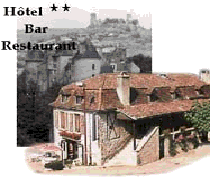 The
course takes place at the Hotel Victor Hugo, in a charming little
market town in a beautiful part of South West France and lasts
seven
days. Bed, breakfast and evening meals, are included in the
price.
The
course takes place at the Hotel Victor Hugo, in a charming little
market town in a beautiful part of South West France and lasts
seven
days. Bed, breakfast and evening meals, are included in the
price.Eugene Ionesco said, "A writer never has a vacation. For a writer life consists of either writing or thinking about writing." For Peter and I, that's certainly true. But that doesn't mean you can't treat yourself of the good things in life while you're writing!
The writers who come on our Courses find themselves working very hard during the week, often achieving more than they ever imagined they would, therefore it’s important that they benefit from all the comforts that you would expect from a hotel: air conditioning, tv, telephones, en suite facilities, a bar, several private terrasses and plenty of space to write. With nothing else to worry about, the writers are able to focus and concentrate on their writing.
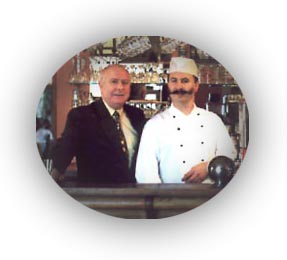 Jean-Luc Vern, the
owner and chef de
cuisine, loves the atmosphere in the hotel when the Writing
Courses are
taking place: with writers and papers and laptops everywhere. He
is
always happy to serve up coffee (or something stronger) to help
keep
the creative juices flowing, and does his utmost to satisfy all
the
writers' requests (within reason!). And after a hard day of
writing, to relax in the restaurant and be served one of his
four-course gourmet meals each evening is the highlight of
everyone’s
day.
Jean-Luc Vern, the
owner and chef de
cuisine, loves the atmosphere in the hotel when the Writing
Courses are
taking place: with writers and papers and laptops everywhere. He
is
always happy to serve up coffee (or something stronger) to help
keep
the creative juices flowing, and does his utmost to satisfy all
the
writers' requests (within reason!). And after a hard day of
writing, to relax in the restaurant and be served one of his
four-course gourmet meals each evening is the highlight of
everyone’s
day. Many people are looking for what our course offers. Those who have come to us, leave at the end of the week with a real sense of achievement - amazed at how much they have accomplished in just seven days. And when we hear that we’ve “made a dream come true” or given someone the best week of their life - we know we’re doing something special!
Or visit our personal websites at:

